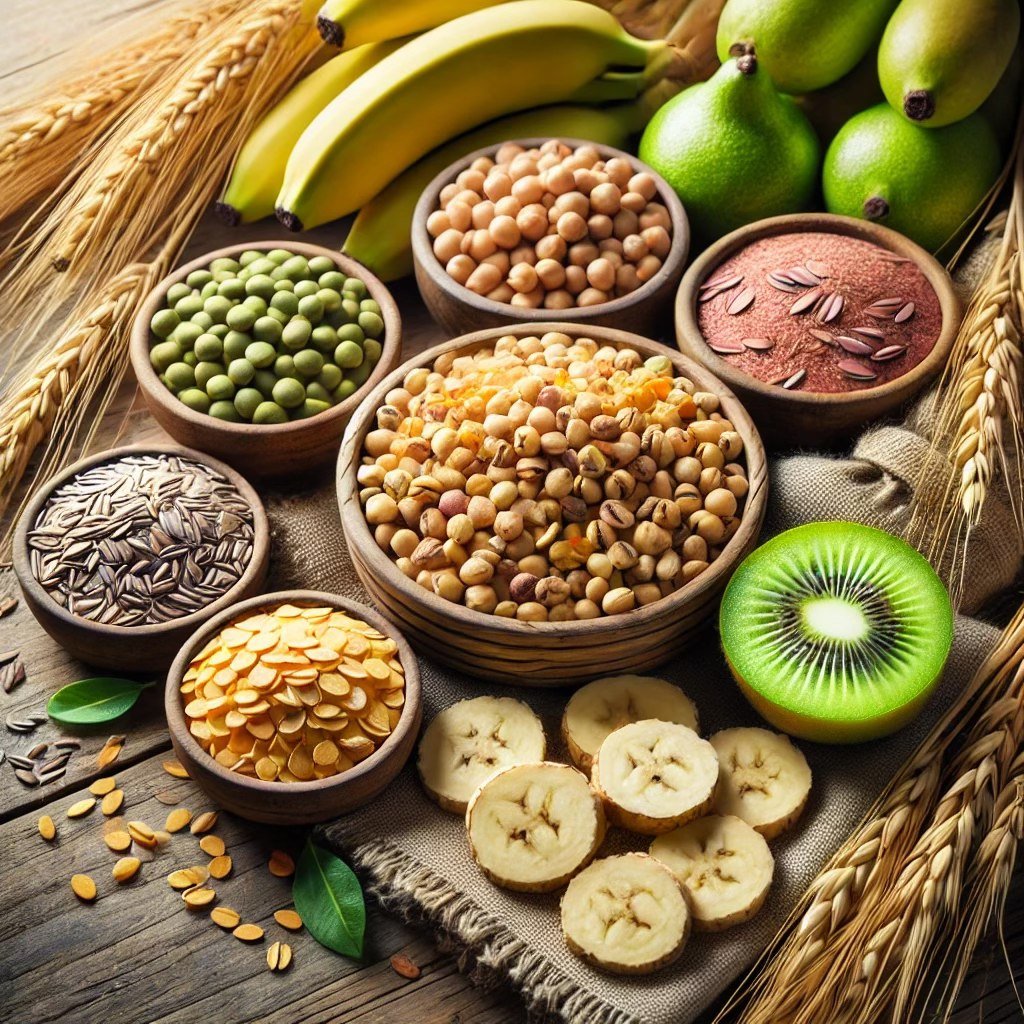Resistant starch is a type of carbohydrate that resists digestion in the small intestine and ferments in the large intestine. This unique property provides a host of health benefits, making it a valuable addition to a balanced diet. In this blog, we will explore the different types of resistant starch, their sources, and the numerous health benefits they offer.
Types of Resistant Starch
Resistant starch can be classified into four main types:
- RS1 (Physically Inaccessible Starch):
- Found in whole or partially milled grains and seeds.
- The structure of these foods prevents digestive enzymes from accessing the starch.
- RS2 (Resistant Granules):
- Present in raw potatoes, green bananas, and some legumes.
- The starch granules are naturally resistant to digestion.
- RS3 (Retrograded Starch):
- Formed when starchy foods are cooked and then cooled, such as in cooked and cooled potatoes, rice, and pasta.
- The cooling process changes the structure of the starch, making it resistant to digestion.
- RS4 (Chemically Modified Starch):
- Produced through chemical processes to resist digestion.
- Commonly found in processed foods like bread and cereals.
Sources of Resistant Starch
Incorporating resistant starch into your diet can be achieved through a variety of foods:
- Whole grains: Barley, oats, and brown rice.
- Legumes: Lentils, chickpeas, and beans.
- Tubers and roots: Raw potatoes and cooked then cooled potatoes.
- Green bananas and plantains: These are rich in RS2.
- Processed foods: Some bread and cereals contain RS4.
Health Benefits of Resistant Starch
Resistant starch offers numerous health benefits, supported by evidence-based research:
- Improved Digestive Health:
- Resistant starch acts as a prebiotic, promoting the growth of beneficial gut bacteria. This can help improve digestive health and reduce the risk of colon cancer (Martinez-Puig et al., 2013 (https://pubmed.ncbi.nlm.nih.gov/23714917/)).
- Enhanced Glycemic Control:
- Consuming resistant starch can help improve insulin sensitivity and lower blood sugar levels after meals, which is beneficial for managing diabetes (Robertson et al., 2005 (https://pubmed.ncbi.nlm.nih.gov/15855303/)).
- Weight Management:
- Resistant starch increases feelings of fullness, which can help reduce overall calorie intake and support weight management efforts (Willis et al., 2009 (https://pubmed.ncbi.nlm.nih.gov/19776142/)).
- Reduced Inflammation:
- Some studies suggest that resistant starch can reduce inflammation markers in the body, potentially lowering the risk of chronic diseases (Zhou et al., 2015 (https://pubmed.ncbi.nlm.nih.gov/25618637/)).
Conclusion
Incorporating resistant starch into your diet can offer a range of health benefits, from improved digestive health to better glycemic control and weight management. By understanding the different types of resistant starch and their sources, you can make informed choices to enhance your overall well-being.
For further reading and detailed research, you can refer to the following studies:
- Martinez-Puig, D., et al. (2013). “Dietary fiber and prebiotics and the gastrointestinal tract.” PubMed (https://pubmed.ncbi.nlm.nih.gov/23714917/)
- Robertson, M. D., et al. (2005). “Insulin-sensitizing effects of dietary resistant starch and effects on skeletal muscle and adipose tissue metabolism.” PubMed (https://pubmed.ncbi.nlm.nih.gov/15855303/)
- Willis, H. J., et al. (2009). “Resistant starch and weight loss in overweight subjects.” PubMed (https://pubmed.ncbi.nlm.nih.gov/19776142/)
- Zhou, J., et al. (2015). “Resistant starch consumption and increased satiety.” PubMed (https://pubmed.ncbi.nlm.nih.gov/25618637/)
By integrating these foods into your diet, you can harness the power of resistant starch to support your health and wellness journey.






